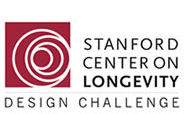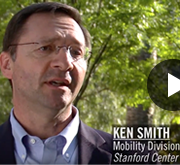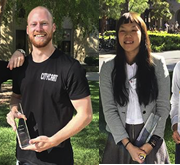2016-17 Stanford Center on Longevity Design Challenge Finalists Announced
/in Home Page, Updates /by admin2016-2017 Stanford Longevity Design Challenge Now Open for Submissions
/in Home Page, Updates /by admin- No cost to enter
- Over $30,000 in cash prizes and travel allowances will be awarded
- Finalists receive industry mentors and a travel award to present at Stanford University
Each year since 2012, the Stanford Center on Longevity has challenged students around the world to design thoughtful products and services that improve the quality of wellbeing across the lifespan. This year’s theme is “Innovating Aging in Place” – developing solutions that improve the lives of those people who remain in their homes, often independently, as they grow older.
- Designs submitted online by December 7 will be judged by a panel of experts and 6-8 finalist teams will be selected.
- Finalist teams will receive a $1000 stipend to refine their designs and be paired with an industry mentor. Past mentors have come from companies like Target, Orange Healthcare, CareInnovations, Home Care Assistance, Transamerica, and Eskaton Senior Living.
- A travel stipend will be awarded to allow a team representative to come to Stanford in April 2017 to pitch to a live audience of experts, academics, and investors.
- The top three places receive cash prizes: $10,000 for 1st place, $5,000 for 2nd, and $1,000 for 3rd.
- All finalists will have the opportunity to learn what it takes to bring great ideas from the drawing board to the marketplace in a day-long workshop at Stanford’s Graduate School of Business.
The Stanford Center on Longevity Design Challenge and Aging 2.0 Collaborate to Reach Students Around the Globe
/in Home Page, Updates /by admin
The Stanford Center on Longevity (SCL) has reached an agreement to expand the global reach of the Center’s Design Challenge through Aging 2.0’s chapter network. The Challenge invites students at any accredited university in the world to learn about longevity issues and submit designs in competition for a $10,000 first prize and paid travel to Stanford for the Challenge Finals in April. In this, the fourth year of the Challenge, students will focus on “Innovating Aging in Place”.
Aging 2.0 is a global innovation platform on a mission to accelerate innovation to improve the lives of older adults around the world. Over the past 4 years, the organization has hosted more than 300 events around the world, cultivating a robust ecosystem of entrepreneurs, technologists, designers, investors, senior care providers and seniors themselves. In addition to its core team in San Francisco, Aging 2.0 has over 30 volunteer-run chapters across the U.S., Australia and Brazil, as well as through Europe and Asia.
During the months of August, September, and October, Aging 2.0 chapters will be encouraged to host a local event focused on getting students in their local geography engaged in the challenge. The Center on Longevity will provide the presentation materials and a small stipend to support meeting costs.
In its first three years, the Challenge has received entries from 23 countries, but the opportunity is still large. “Once students hear about the challenge, they usually want to get involved. Making them aware of the opportunity, however, can be a difficult problem”, said Ken Smith, who directs the challenge for SCL. “Working through Aging 2.0’s distributed chapter network should help bridge that gap.”
“We’re thrilled to be expanding our collaboration with the Stanford Center on Longevity, and their world-class Design Challenge”, noted Stephen Johnston, co-founder of Aging2.0. “The Challenge gains local advocates in over 40 cities around the world, and our Chapters get an exciting and tangible way to engage with their local academic communities.”
The challenge submission platform is scheduled to open in early September and participants will have until December 7th to submit their designs.
Video: 2015 – 2016 Design Challenge Finals Event
/in Home Page, Updates /by adminIn this video, learn more about the Challenge, and hear from the winners, sponsors and judges who took part in this year’s competition.
City Cart & Memoir Monopoly Win the Stanford Center on Longevity 2015-2016’s Design Challenge Grand Prizes!
/in Home Page, Updates /by adminYedi70 and Potalk win 2nd & 3rd prize in Mind category; Bath Chair and Echo win 2nd & 3rd prize in Mobility category
We’re proud to announce the $10,000 grand prize winners of our 2015-2016 Design Challenge: City Cart, in the Mobility category, and Memoir Monopoly, in the Mind category. Winners were selected on April 5, 2016 by a panel of experts after an all-day pitch session in front of a capacity crowd of industry leaders, educators, and community advocates at the Stanford Center on Longevity.
Second and third place winners were Bath Chair and Echo for Mobility, as well as Yedi70 and POTALK for Mind.
Following the judging, all finalists were invited to participate in a day-long workshop at the Stanford Graduate School of Business to learn more about how to turn their projects from prototypes into marketable products.
Here’s a closer look at this year’s finalists and winners:
Grand Prize Winners, Stanford Center on Longevity’s 2015-2016 Design Challenge
City Cart (Mobility) from Brandon Lopez and Eric Renard of San Francisco State University, is a walker/cart hybrid designed to help users with mobility issues safely and easily make shopping trips. Read more about City Cart >
Memoir Monopoly (Mind) from Cho Szu-Yang and Cheng Ya-Fang of National Taiwan University of Science and Technology, is a tablet-based rehabilitation game platform for dementia patients, integrating photos from the players’ lives into interactive challenges that exercise their memory and recognition abilities. Read more about Memoir Monopoly >
Runners-up & Finalists, Stanford Center on Longevity’s 2015-2016 Design Challenge
Second and third place winners in the Mobility and Mind design categories will also receive mentorship and awards of $5,000 and $2,000 (respectively) to further develop their designs:
● Bath Chair – 2nd place, Mobility: Designed by students from National Yunlin University of Science and Technology, Bath Chair is a portable bath designed to help the mobility-impaired safely wash themselves while remaining in a seated position. Read more about Bath Chair >
● Yedi70 – 2nd place, Mind: Designed by students from Koc University at Istanbul, Yedi70 is a social network and informational resource for seniors connected to an online marketplace. Read more about Yedi70 >
● Echo – 3rd place, Mobility: Designed by students from National University of Singapore, Echo is a wireless, audio wayfinding kit that helps people who’ve recently become visually impaired to develop awareness of their surroundings. Read more about Echo >
● POTALK – 3rd place, Mobility: Designed by students from National Chiao-Tung University, POTALK is a potted plant with watering system triggered by a microphone, encouraging isolated people to talk with others. Read more about POTALK >
See all twelve 2015-2016 finalist designs here. We were thrilled to meet the finalists who traveled from around the world to tour the Stanford campus and Stanford’s dSchool, join us for industry tours of IDEO and Google, and pitch their entries at the Center on Longevity. Many of these designs are already on their way to becoming real products and services to enhance long live for everyone. We hope to see great things from all our participants.
Follow us @StanfordLngLife on Twitter and via our Facebook page for more updates — including announcements on “Innovating Aging in Place” (tentative title), the theme for our 2016-2017 Design Challenge!
Acknowledgements and Thanks to Our Sponsors & Judges
We’re grateful to the guidance and sponsorship of these industry leaders which made this year’s Challenge possible: Halbert Hargrove Investments, Target, Fidelity, Lixil, CareInnovations, Home Care Assistance, Airbnb, Eskaton, and the Davis Phinney Foundation.
Special thanks as well to all the experts who volunteered their time to judge the finalists’ pitches, and nominate the initial entries:
Mind Judges
● Jonathan Stevens, SVP, Thought Leadership, AARP
● Doug Fisher, SVP of Thought Leadership and Policy Development, Fidelity Investments
● Anita Roth, Head of Policy Research, Airbnb
● Karissa Price, Chief Marketing Officer, CareInnovations
● Sheri Peifer, Senior Living Chief Strategy Officer, Eskaton
● Katie Libbe, VP Consumer Marketing & Solutions, Allianz Life
● Sha Yao, designer of Eatwell, SCL’s 2014-2015 Design Challenge winner
Mobility Judges
● Alexis Kantor, Director of Apparel and Accessories Product Development, Target
● Megan Heinen, Director of Marketing, Home Care Assistance
● Polly Dawkins, Executive Director, Davis Phinney Foundation
● Hannah Torkelson, ORISE Fellow – US President’s Council on Fitness, Sports, and Nutrition
● Scott Peifer, Vice President, Alliance Development, Aging 2.0
● Anne Friedlander, Stanford Professor of Human Biology
● Kelly Soyland, Director of Innovation and Research and The Vivo Innovation Center, Good Samaritan
Entry Judges (Finalists Selection)
● William Bao Bean, Investment Partner, SOS Ventures
● Amber Case, Entrepreneur and Author
● Josh Constine, Journalist, TechCrunch
● Katherine Dotter, Nutrition Research Innovation Manager, Stanford School of Medicine, SPRC
● James R. Doty, MD Director and Founder, Center for Compassion and Altruism Research and Education at Stanford; Clinical Professor of Neurosurgery, Stanford University
● Anne Friedlander, PhD Consulting Professor, Program in Human Biology, Stanford University
● Gopi Shah Goda, Senior Research Scholar, Stanford Institute for Economic Policy Research (SIEPR), Stanford University
● Frank (Gard) Jameson, Author and Professor, University of Nevada, Las Vegas
● Alexis Kantor, Director of Apparel and Accessories Product Development, Target Corporation
● Surya Kolluri, Managing Director, Policy and Market Planning Global Wealth and Retirement Solutions, Bank of America/Merrill Lynch
● Joanna Lahey, Associate Professor, The Bush School of Government & Public Service, Texas A&M University
● Katie Libbe, Vice President, Consumer Marketing and Solutions, Allianz Life Insurance Company of North America
● Om Malik Former, Journalist and Founder, GigaOM
● James Mahaney, Vice President, Strategic Initiatives, Prudential
● Patricia Milligan, Global Leader, Multinational Client Group, Mercer
● Jin Song, Montesano Chief Public Affairs Officer, LIXIL Group Corporation
● Sheri Peifer, Chief Strategy Officer, Eskaton
● Karissa Price-Rico, Chief Marketing Officer, Intel-GE Care Innovations
● Alison Reid, Vice President, Global Public Relations & Social Media, Bare Essentials
● Jennifer Romano-Bergstrom, PhD, User Experience Researcher, Facebook
● Anita Roth, Head of Policy Research, Airbnb
● Darren Sabo, Principal of Digital Health Solutions, Orange Silicon Valley
● Robert Scoble, Tech Evangelist
● Jason Scott, Managing Director, Retiree Research Center
● Paul Tang, MD Vice President, Chief Innovation & Technology Officer, Sutter Palo Alto Medical Foundation
● Jeanne Thompson, Vice President of Thought Leadership, Fidelity Investments
● Hannah Torkelson, ORISE Fellow, President’s Council on Fitness, Sports & Nutrition
Based on an exciting and fast-paced day of pitches from our talented finalists, our panel of judges selected our 2015-2016 winners. In the Mind division, first place went to “Memoir Monopoly” from National Taiwan University of Science and Technology, and the Mobility top prize went to “City Cart” from San Francisco State.
APRIL 5th FINALS EVENT AGENDA
/in Home Page, Updates /by adminOur judges have selected the top six teams in two categories (Mind and Mobility), and they will pitch their presentations before a live audience to determine the winner of the cash prizes. In addition to our finalists presentations, the day will feature talks from Dr. Tom Rando (Stanford University) and Dr. Joyce Yen Feng (Taiwan Executive Yuan).
FILLanthropy: Mind Finalist in This Year’s Design Challenge
/in Finalists, Home Page, Updates /by adminFILLanthropy (Mind)
Team Lead: Annabel Chen
University: Stanford University
An online volunteer matching service for people of all backgrounds and interests who want to share their time and talent with each other, FILLanthropy emerged from team lead Annabel Chang’s studies at the Stanford Center on Longevity’s practicum course. “I’m writing a paper with Dawn Carr (another researcher at the Center) about the importance of promoting Asian volunteerism in healthy aging,” she explains, “and decided that this would be something worth doing a Design Challenge on.”
Designing FILLanthropy
“We started toying with the idea last Summer, and refined the concept throughout the year. We created about four versions of the concept before settling on the volunteering matching model. We had three versions of the website before we arrived at the one that we submitted.”
Lessons Learned Designing FILLanthropy
“The most important thing to keep in mind was that we have to design for everyone, but to address a problem that faces seniors. All research points to the fact that starting volunteering before retirement has the most positive effects. We also learned that there’s a huge gap between what research says is good for aging, and what people actually want to do. Most people/agencies that we talked to agreed that this would be something that’s good for them, but still seemed hesitant about starting volunteering.”
Future Plans for FILLanthropy
“We plan on launching the website and start rallying local retirement homes and non-profits to implement it. Our next big step would also be to expand our design to incorporate other languages.”
Yedi70
/in Finalists, Home Page, Uncategorized, Updates /by adminYedi70 (Mind)
Team Lead: Özge Armutcu
University: Koc University at Istanbul
A social network and informational resource for seniors connected to an online marketplace, Yedi70 was partly inspired by attendance at the Global Summit on Aging 2.0 in San Francisco last May, where the team met the managing board of the Stanford Center on Longevity. “We were very inspired by their mission, and we noticed that our vision matched theirs,” says team lead Özge Armutcu. “This was the reason that we decided to pursue this challenge.”
Yedi70 was also motivated by a personal tragedy among the team:
“Fatih, one of our cofounders, lost his grandmother in 2013 due to pancreatic cancer. After this loss, he talked with her friends, now the partners of Yedi70. After further research, we found that there was a reality that we were never aware of: the world is aging drastically. We started thinking about how we could improve quality of life and preventative health among seniors.”
Time Developing Yedi70
“We started the project on July 6th 2015, and the website was launched in October 2015. We are still using the first version of our design; however, day by day we are implementing new features while keeping the core essence of our design. For instance, we launched our personalization technology in February 2016.”
Design Lessons Learned Creating Yedi70
‘From our initial research, we found out that the world population is aging drastically. During our testing period, we noticed that people needed guidance and systematic recommendations along with services that they can easily access through a personalized marketplace.”
Future Plans for Yedi70
“By the end of December 2016 we would like to reach 300,000 members in Turkey. We believe that our design is not bound to any location, but on the contrary, can be a global solution for seniors. Starting in 2017, we want to scale our model to the US market, and then expand our model globally.”















